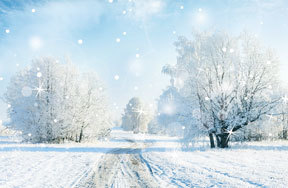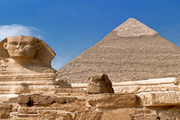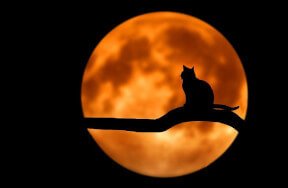When water on land or in the ocean evaporates - turns from a liquid to water vapor - it rises. The water vapor cools and turns back into a liquid in the shape of tiny droplets. The result is clouds, unless it's on the ground - then we call it fog. When enough droplets get together they fall to the ground as rain or if it's very cold, they freeze and fall down as snow, sleet or hail.
Clouds play an important role in the energy balance of Earth. They cool the earth by reflecting sunlight back out to space. How else do you think astronauts see where they are going? More importantly, clouds replenish our water supply. It's a never-ending cycle but one that keeps the earth balanced.
You can tell a lot by looking at a cloud's shape, size and texture. Clouds are put into categories according to their shape, how high they are in the sky, their size, how fast and in what direction they are moving, etc. The three different types of clouds are high clouds (because they are high in the sky), medium clouds and low clouds (just over 10,000 feet high or 3 km.)
High Clouds
Cirrus (Ci): The ice-crystal cloud is a feathery white cloud that is the highest in the sky. It has a wispy looking tail that streaks across the sky and is called a fallstreak.
 Cirrus Clouds
Cirrus Clouds
Cirrostratus (Cs): A milky sheet of ice-crystal cloud that spreads across the sky. It's easy to name because it's the only cloud type that creates a ring or halo around the sun or moon. There's an old proverb that goes, "A ring around the sun or moon brings rain or snow upon you soon."
Cirrocumulus (Cc): This very rare cloud type appears in clusters of small, white, roundish patches.
 Cirrocumulus Clouds
Cirrocumulus Clouds
Low clouds
Cumulus (Cu): The fair weather cloud. Each cloud looks like a cauliflower.
 Cumulus Clouds
Cumulus Clouds
Stratocumulus (Sc): A layer of cloud that can sometimes block the sun. It looks like a thick white blanket of stretched out cotton.
 Stratocumulus Clouds
Stratocumulus Clouds
Stratus (St): A fog that isn't that far above the ground. In the morning, wind can push very low fog into stratus clouds. This can be a hazard for hikers.
 Stratus Clouds
Stratus Clouds
Rain Clouds
Nimbostratus (Ns): The dark, rain carrying cloud of bad weather. It is to blame for most of the winter rains and some of the summer ones. It covers the sky and blocks the sun. You have to fly in a plane through the cloud to realize how deep and solid this cloud can be.
 Nimbostratus Clouds
Nimbostratus Clouds
Cumulonimbus (Cb): The cloud that produces showers and thunderstorms. The rain comes and goes with these clouds. Big Cb clouds have lumps that look like cows' udders, called mamma. In the US if you see a mamma this might mean a possible tornado.
 Cumulonimbus Clouds
Cumulonimbus Clouds
To continue, click here.

































